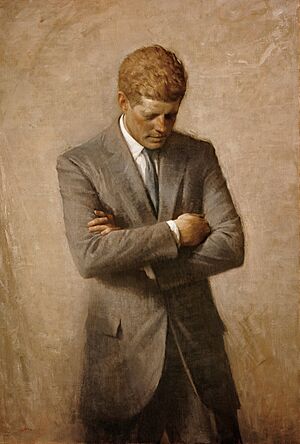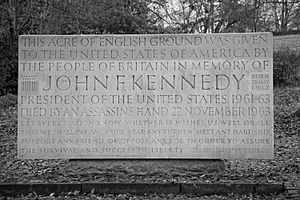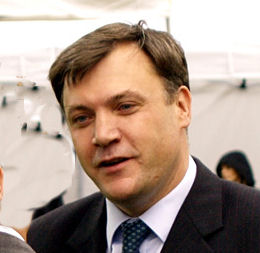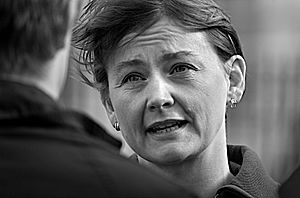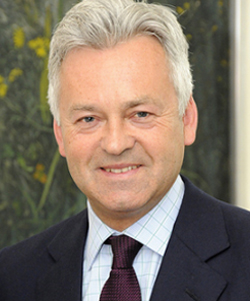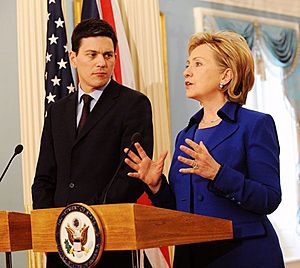Kennedy Scholarship facts for kids
The Kennedy Scholarships help British students go to two famous universities in the United States: Harvard University or the Massachusetts Institute of Technology (MIT). These scholarships give students all the money they need for their studies after their first degree. Susan Hockfield, who used to be the President of MIT, said the scholarships give amazing students special chances to learn and grow. This is very important today, as people from all over the world work together. In 2007, 163 students applied, but only 10 were chosen. This shows how special these scholarships are!
Contents
Why the Kennedy Memorial Trust Was Created
After President John F. Kennedy was sadly killed in 1963, Sir Alec Douglas-Home, who was the Prime Minister of the United Kingdom at the time, wanted to create a special British memorial for him. He talked with important people like Harold Wilson (the leader of the main opposition party) and the Kennedy family. They all agreed that a committee should decide what kind of memorial would be best.
This committee, led by Lord Franks, decided on two things. First, there would be a "living memorial" – the scholarships to Harvard or MIT. Second, there would be a permanent memorial site in Runnymede, England. Runnymede was chosen because it's where the Magna Carta was signed, which is seen as the start of many freedoms that President Kennedy believed in. A law called the John F. Kennedy Memorial Act 1964 was passed to make these two memorials happen.
The Kennedy Family's Support
The Kennedy family has always strongly supported the British memorial. Before World War II, Joseph P. Kennedy Sr. was the United States Ambassador to the United Kingdom. In 1965, Jacqueline Kennedy (President Kennedy's wife) and Queen Elizabeth II officially opened the memorial at Runnymede. It has a special stone tablet in a beautiful natural area. The stone has a famous quote from President Kennedy's speech on January 20, 1961:
Let every Nation know, whether it wishes us well or ill, that we shall pay any price, bear any burden, meet any hardship, support any friend or oppose any foe, in order to assure the survival and success of liberty.
Senator Edward Kennedy, President Kennedy's brother, said the scholarship program was the most important memorial to his brother. He was a big supporter of the Kennedy Scholarships until he passed away in 2009.
Who Manages the Scholarships?
The Kennedy Memorial Trust is managed by a group of people called trustees. Since 1964, the Prime Minister of the United Kingdom has chosen these trustees. Many important people have been trustees over the years, including famous philosophers, historians, and economists.
The current trustees include:
- Professor Tony Badger (Chairman) – a former professor of American History.
- Dr Peter Englander – a former Kennedy Scholar and business expert.
- Stephanie Flanders – a former Kennedy Scholar and financial expert.
- The United States Ambassador to the United Kingdom – who represents the President of the United States.
- Professor Anthony Saich – who represents Harvard University.
- Professor Andrew Whittle – a former Kennedy Scholar, who represents MIT.
The scholarships also have special supporters called patrons, including the Lord Mayor of London and the Governor of the Bank of England.
How Scholars Are Chosen
More than 500 people have received a Kennedy Scholarship since it began. Students apply each autumn. The trustees carefully review applications and invite about 25 students to London for an interview.
When choosing scholars, the trustees look for:
- Excellent grades and academic skills.
- The ability to speak clearly and express ideas.
- If their chosen studies at Harvard or MIT are a good fit.
They also look for students who are:
- Original thinkers.
- Committed to helping others.
- Likely to make a positive impact in the world.
- Able to overcome challenges.
The way Kennedy Scholars are chosen is similar to how students are selected for the famous Rhodes Scholarship.
Famous Kennedy Scholars
Many Kennedy Scholars have gone on to do amazing things in different fields.
Politics and Government
- Ed Balls – a politician who was in charge of children's schools and families.
- Nicholas Boles – a politician who worked for the London Mayor.
- Camilla Cavendish – a journalist who became a government advisor.
- Yvette Cooper – a politician who held important roles in government.
- Sir Alan Duncan – a politician who served as a Minister for International Development.
- Kwasi Kwarteng – a politician who became the Secretary of State for Business.
- David Miliband – a politician who was the Foreign Secretary.
- Chris Smith, Baron Smith of Finsbury – a politician who was in charge of culture, media, and sport.
- William Arthur Waldegrave, Baron Waldegrave of North Hill – a politician who held many important government jobs.
Economics and Finance
- Ros Altmann – an economist who became a Minister for Pensions.
- Mervyn King – who used to be the head of the Bank of England.
- Emma Rothschild – a historian who studies economics.
Journalism
- Stephanie Flanders – a well-known economics editor for the BBC.
- Zanny Minton Beddoes – the editor of The Economist magazine.
- Simon Kuper – a journalist and author for the Financial Times.
Arts
- Hannah Sullivan – a talented poet.
Academia (University Life)
- Andrew Blake – a scientist who directs the Alan Turing Institute.
- Peter Hennessy – a historian and professor.
- Simon Goldhill – a professor who studies ancient Greek literature.
- Rana Mitter – a professor who studies the history and politics of modern China.
Law
- Mary Arden – a high-ranking judge.
- Nicholas Hamblen – a High Court Judge.
 | DeHart Hubbard |
 | Wilma Rudolph |
 | Jesse Owens |
 | Jackie Joyner-Kersee |
 | Major Taylor |


